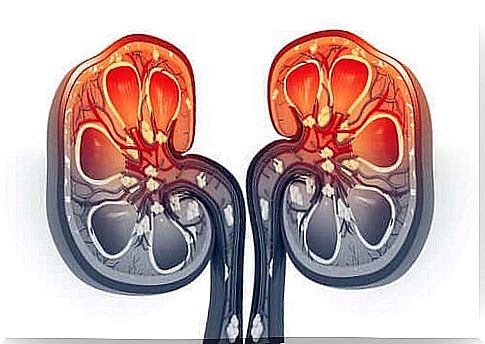Kidney Abscess: Know Some Treatments

Risk factors for kidney abscess

Factors that predispose to the development of renal abscesses have been identified. Some of the most important are:
40% of patients have multiple associated risk factors. Patients with more than 10 years of diabetes diagnosis need more often intensive care and nephrectomy.
The duration of symptoms before diagnosis is, on average, 11 days. However, only 35% of patients are correctly diagnosed when hospitalized. This is due to the lack of specific clinical data.
Causes
A kidney abscess is caused by urinary infections that start in the bladder. Then they spread to the kidneys and then to the area around them.
Surgery on the urinary tract or reproductive system, or an infection of the bloodstream, can also lead to a kidney abscess.
The biggest risk factor for kidney abscess is kidney stones, which block the flow of urine. This favors the spread of infection. Bacteria tend to adhere to stones and antibiotics cannot destroy them.
Stones appear as a cause in 20% to 60% of people with kidney abscess. Other risk factors for kidney abscess include diabetes, an abnormal urinary tract, trauma, or intravenous drug use.
Symptoms and Diagnosis

Some of the symptoms of kidney abscess are chills, fever, sweating and pain in the back or abdomen.
Diagnostic tests include:
Treatment
Abscess drainage, either percutaneously or openly, is the most accepted treatment. To treat a kidney abscess, the pus can be drained through a catheter that is placed through the skin or with surgery.
Likewise, antibiotics must be administered initially through a vein. Then you can switch to oral treatment when the infection starts to get better. Open drainage is the most likely option to resolve renal abscess.
Antibiotics for kidney abscess
Antibiotics are the first line of treatment for kidney abscess. Medications and duration of use will depend on the patient’s health status. However, we must also take into account the bacteria found in the urinalysis.
The signs and symptoms of a kidney infection usually start to go away within a few days of treatment. However, it may be necessary to continue taking antibiotics for a week or more.

It is advisable to perform another urine culture to ensure the infection has cleared. However, if the infection persists, another antibiotic treatment should be given.
If the infection is severe, hospitalization may be necessary. In this case, treatment may comprise antibiotics and fluids given intravenously.
To reduce discomfort during the recovery process from a kidney infection, a series of measures can be adopted, such as:
- Apply heat: Place a thermal compress on the abdomen, back or sides to relieve pain.
- Using pain relievers: To reduce fever or reduce discomfort, pain relievers such as acetaminophen or ibuprofen are used.
- Drinking fluids: Maintaining a good level of hydration can help eliminate bacteria from your urinary tract. Also, it is advisable to avoid coffee and alcohol until the infection is gone.
Kidney abscesses are serious complications that we must pay attention to. In case of any symptoms, it is advisable to consult the specialist so that he makes the correct diagnosis and the problem does not lead to worse consequences.








